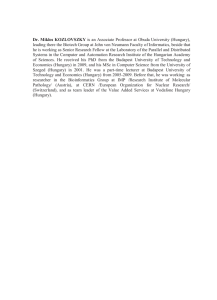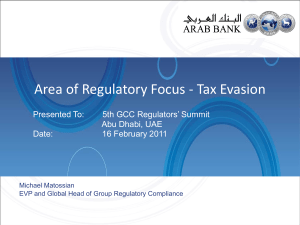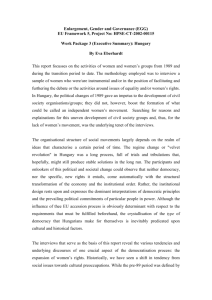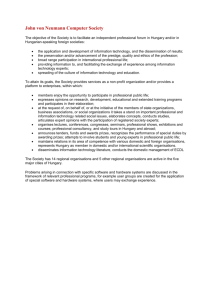The Fight against Income Tax Evasion in Hungary Zoltán Imre Nagy Óbuda University
advertisement
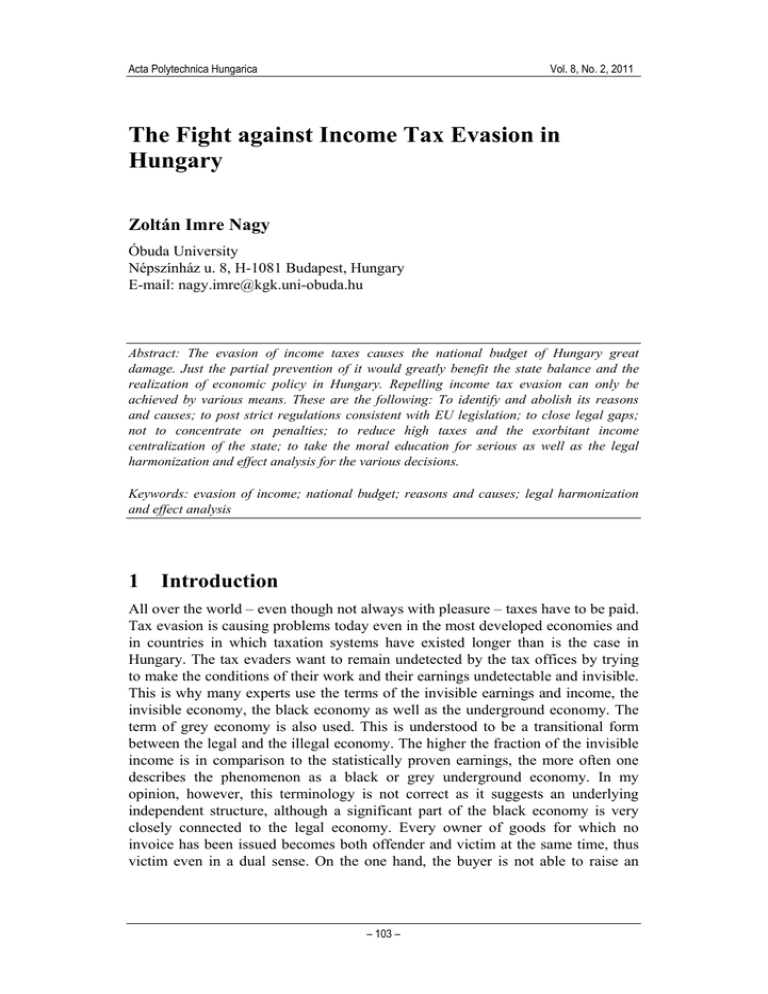
Acta Polytechnica Hungarica Vol. 8, No. 2, 2011 The Fight against Income Tax Evasion in Hungary Zoltán Imre Nagy Óbuda University Népszínház u. 8, H-1081 Budapest, Hungary E-mail: nagy.imre@kgk.uni-obuda.hu Abstract: The evasion of income taxes causes the national budget of Hungary great damage. Just the partial prevention of it would greatly benefit the state balance and the realization of economic policy in Hungary. Repelling income tax evasion can only be achieved by various means. These are the following: To identify and abolish its reasons and causes; to post strict regulations consistent with EU legislation; to close legal gaps; not to concentrate on penalties; to reduce high taxes and the exorbitant income centralization of the state; to take the moral education for serious as well as the legal harmonization and effect analysis for the various decisions. Keywords: evasion of income; national budget; reasons and causes; legal harmonization and effect analysis 1 Introduction All over the world – even though not always with pleasure – taxes have to be paid. Tax evasion is causing problems today even in the most developed economies and in countries in which taxation systems have existed longer than is the case in Hungary. The tax evaders want to remain undetected by the tax offices by trying to make the conditions of their work and their earnings undetectable and invisible. This is why many experts use the terms of the invisible earnings and income, the invisible economy, the black economy as well as the underground economy. The term of grey economy is also used. This is understood to be a transitional form between the legal and the illegal economy. The higher the fraction of the invisible income is in comparison to the statistically proven earnings, the more often one describes the phenomenon as a black or grey underground economy. In my opinion, however, this terminology is not correct as it suggests an underlying independent structure, although a significant part of the black economy is very closely connected to the legal economy. Every owner of goods for which no invoice has been issued becomes both offender and victim at the same time, thus victim even in a dual sense. On the one hand, the buyer is not able to raise an – 103 – Z. I. Nagy The Fight against Income Tax Evasion in Hungary objection in the event of quality problems, if there are defects with the purchased goods or services. One the other hand, the person who makes use of illicit employment experiences disadvantages as a member of society, due to the fact that the reduced public revenue affects public services. That is problematic in particular when austerity measures are introduced as a consequence of reduced public revenue and increased national debt. As a result, the effectiveness and quality of public services should be increased with less financial means. Hence it is no coincidence that the national legislation in various countries ranks the group of people down who purchase without acquiring an invoice. This solution was also discussed in Hungary, but at present the population is encouraged to purchase and acquire an invoice by a lottery procedure. Each invoice for a service over 1000 HUF participates in a monthly lottery drawing. Excluded are citizens who work in municipal public utilities. This solution does not seem to be effective; more resolute measures of the government would be absolutely necessary. The terminology of black economy can be looked at in terms of organisation, because the notion of black economy correctly indicates organisation. As examples, some of the biggest cases of tax evasion in Hungary will be analysed, such as the “invoice factory” in Vecsés, near Budapest, or the incidents which were colloquially referred to as the “oil blonding cases”. In these cases diesel fuel for motor vehicles was produced by removal of the red colouring. Thereby mineral oil taxes as well as value added tax were avoided. This tax evasion normally ensured a high additional profit for the seller, very often as well for the buyer (In the end of the 1990s the capital of the oil blonding is said to have fled into the alcohol and drug industry due to the restrictive tax legislation). The term of a black economy (underground economy) – as also showed by the examples above – as well correctly points towards relations with crime. Income tax evasion very often leads to relationship with other criminal acts. It is well known that the notorious mafia boss Al Capone was finally arrested and convicted in the United States of America because of tax evasion. This illustrates how important it is, even for a criminal organisation such as the mafia, to respect the laws of taxation in a highly developed society of market economy. In the following the terms invisible income and tax evasion will be used instead of black economy, because these terms better express that no one is able to estimate well the societal losses due to the fact that the unwanted processes are indeed invisible. 2 The Size of the Invisible Income According to the estimates of experts, the proportion of income tax evasion in developed industrial countries ranges between 5 and 20% in relation to the annual gross domestic product (GDP). In comparison to that, it is likely to be significantly higher in Hungary. Although there are some doubts regarding these approaches it is to notice that income tax evasion is particularly widespread in – 104 – Acta Polytechnica Hungarica Vol. 8, No. 2, 2011 Hungary compared to these countries. (Several experts even assume that the proportion of the invisible income in the developed industrial countries ranges between 20 and 50%.) In Hungary the GDP in 2007 was 25.374 billion HUF (the level of the GDP in 2008 was lower by 1%). Since the national income centralisation in Hungary amounts to more than 50% (in 2006 in Hungary the income centralisation was even 54,6%, which experts in the Central European region consider to be very high and harmful)1, in Hungary one can calculate with an annual loss of national minimum income of 2.500 billion HUF (10 billion Euro). The tax centralisation in Hungary is about 38%, the overall national tax loss should be around at least 1.900 billion HUF each year (7 billion Euro). Of course the multiplier effect2 alleviates this enormous sum, because it is not a matter of visible processes. This is a problem for Hungary and also it is made more difficult by the fact that 60% of the tax revenues and premium incomes originate from Budapest and the district of Pest (the surrounding area of Budapest). The reasons for the high level of invisible income in Hungary are traced back to various factors; among others, one fact that figures prominently is that Hungary’s modern taxation system was only introduced in 1988 at the time of the change of regime. Table 1 Tax centralisation in Hungary, the tax revenues and premium incomes of the Hungarian state budget in % of the GDP. Source: see Figure 1 Year In% of GDP 1998 39,1 1 1999 39,2 2 2000 38,6 3 2001 38,34 4 2002 37,9 5 2003 37,7 6 2004 37,5 7 5 6 7 2005 37,2 8 2006 38,2 9 2007 39 10 2008 39,8 11 40,00 39,50 39,00 38,50 38,00 37,50 37,00 36,50 36,00 35,50 1 2 3 4 8 Figure 1 Tax centralisation in Hungary 1999-2008, 1 → 1999 1 2 See lecture of Békesi 2006 See paragraph 3 – 105 – 9 10 11 Z. I. Nagy The Fight against Income Tax Evasion in Hungary Sources: 1) Békesi, lecture, Mindentudás Egyeteme 2006: http://www.mindentudas.hu/bekesilaszlo/20060917bekesi1.html?pIdx=3 2) MTI June 26 2009: http://www.origo.hu/uzletinegyed/valsag/20090626-oszko-33szazalekracsokkenhet-az-adocentralizacio.html The extent of the Hungarian tax centralisation is slightly lower than the average tax centralisation of the EU countries (39-40%). Considering the rate of Hungary, however, in comparison with those of the Baltic countries and of Ireland, it is clear that the extent of tax centralisation in Hungary is essentially higher. Moreover, it is even higher than the level of the Visegrád states (Poland, Slovakia, Czech Republic and Hungary) (30-36%). 3 The Reasons for Income Tax Evasion In general, it is correct that moral scruples against income tax evasion are decreasing globally. This fact is certainly related to the increasing egoism and decreasing collective spirit. In analysing the reasons, however, firstly the rational, economic, so called traditional models, must be mentioned, to explain income tax evasion as a risk charged decision problem, where the taxpayer wants to increase his income also by means of income tax evasion, while he probably takes the following aspects into consideration: the probability of detection, the extent of monetary fines and other penalties, the general tax burden, the level and the slope of the graduated tariff and the amount of the tax free income, as well as the amount of the real income. The increased probability and the enhanced risk of detection decrease the amount of cases of income tax evasion. The successful inspections of fiscal authorities provide a very high degree of prevention. However, international researchers have not been able to prove statistically that the extent of penalties (surcharges and fines) had a significant effect on cases of income tax evasion. The answer is quite simple. The determination of the penalties is naturally one of the competences of the legislature, while the inspection of the taxpayers remains a task of the tax offices. The parliament and the judiciary seem not to be capable of adjusting the penalties for income tax evasion with an appropriate speed. Thus no positive effects are achieved and the unwanted processes are not pushed back. Of course in the parliament the political aspects of the decisions are important. A penalty, on the other hand, for income tax evasion does not significantly have deterrent effects. In researching the causes of income tax evasion, more and more psychological, sociological and other aspects are being brought into consideration. This is correct, as it is undisputed that the particular factors which influence income tax evasion are emphasised by psychological and sociological regularities of the behaviour of the taxpayers. – 106 – Acta Polytechnica Hungarica Vol. 8, No. 2, 2011 Worldwide the view is widespread that one of the main motives for income tax evasion is the high average tax burden. Moreover other elements added to high taxes lead to an even higher illegalisation of the income (health care and pension insurance contributions, employer’s and employee’s contribution to social insurance). As shown above, the Hungarian tax burden is particularly high in comparison to the neighbouring and competing eastern European countries. Experiences at the international level demonstrate that the taxpayers react to an increase of the average tax burden of 1% with an increase of tax income evasion of 8%. This stochastic interrelation naturally depends on different country-specific factors, but it illustrates that the extent of income tax evasion as a reaction to an increase in taxation is much greater than the extent of the original tax increase. Many taxation experts claim that this allegation is also true the other way around. This means: with a decrease in taxation income tax evasion would decrease as well and the state could in this case receive higher revenue. However, this cannot be proven, especially not in the short term. In my opinion there are highly complex connections which determine whether taxpayers are motivated towards income tax evasion. Table 2 Hungarian graduated tariffs of the income tax for individuals 2005-10 in HUF 2005 Tax base 0- 1 500 000 1 500 0012006 Tax base 0- 1 550 000 1 550 0012007 Tax base 0- 1 700 000 1 700 001 Fixed tax 270 000 + Tax % 18 38 Fixed tax 279 000 + Tax % 18 36 Fixed tax 306 000 + Tax % 18 36 2008 Tax base Fixed tax 0- 1 700 000 1 700 001306 000 + 2009 Tax base Fixed tax 0- 1 900 000 1 900 001342 000 + 2010 Tax base Fixed tax 0- 5 000 000 * 5 000 000850 000+ *Super gross tax base Tax % 18 36 Tax % 18 36 Tax % 17 32 In the years 2007 and 2008 a so-called special tax in the amount of 6.325.450 HUF (+ 4%) was raised. This is equivalent to a total tax burden of 40%. From 2002 to 2006 the minimum wage was tax-free by means of an income tax credit up to a monthly income of 62.500 HUF (minimum wage in 2006). While the minimum wage was increased to 65.500 HUF in 2007, to 69.000 HUF in 2008 and to 71.500 HUF in 2009, the amount of the tax credit was not changed. So on the minimum wage a higher and higher tax was imposed, even though it is only subject to a low tax burden of 1-2%. – 107 – Z. I. Nagy The Fight against Income Tax Evasion in Hungary Table 3 Inflation rate in the so called Visegrád countries and in Austria in % Source: KSH (Central Statistical Office Hungary) Country 1999 Austria 0,5 2000 2001 2002 2003 2004 2005 2006 2007 2008 2,0 2,3 1,7 1,3 2,0 2,1 1,7 2,2 3,2 Poland 7,2 10,1 5,3 1,9 0,7 3,6 2,1 1,3 2,6 4,2 Slovakia 10,4 12,2 7,2 3,5 8,4 7,5 2,8 4,3 1,9 3,9 Czech Rep. 1,8 3,9 4,5 1,4 -0,1 2,6 1,6 2,1 3,0 6,3 Hungary 10,0 10,0 9,1 5,2 4,7 6,8 3,5 4,0 7,9 6,0 After in Hungary the tax burden – due to the missing adjustment of the graduated tariffs table – was increased in parallel with the inflation rate, this factor had increasing effects on income tax evasion.3 In Hungary the minimum and the average wage are proportionally low4 and even with a relatively low wage the income is taxed according to the higher tax zone. The presented tax tables show that the government has raised only the upper limit of the tax zones of 18% all in all three times to a small extent in the last five years. The largest zone broadening of the smaller tax rates was 200.000 HUF. This is an annual tax saving of 36.000 HUF (130 Euro annually). That is very little and it cannot be seen as an enhancing of value, especially not when one takes Hungary’s inflation rate into consideration.5 Table 4 Monthly average wage and minimum wage in Hungary in HUF Source: KSH (Central Statistical Office Hungary) Year 2001 Average wage 103 553 122 482 137 193 145 520 158 343 171 351 185 017 198 942 Minimum wage 2002 40 000 2003 50 000 2004 50 000 2005 53 000 2006 57 000 2007 62 500 65 500 2008 69 000 250 000 Ft 200 000 150 000 100 000 50 000 0 1 2 3 4 5 6 7 8 2001-2008 Figure 2 Monthly average wage and minimum wage in Hungary in HUF, Source: KSH (Central Statistical Office Hungary) See Table 2 See Table 4 5 See Table 3 3 4 – 108 – Acta Polytechnica Hungarica Vol. 8, No. 2, 2011 Table 5 Monthly average and minimum wage in EU countries (January 2008), in Euro Source: Pályacsúcs Magazine Hungary Feb 19 2008 Country Bulgaria Romania Lithuania Slovakia Latvia Hungary Estonia Poland Czech Republic Portugal Slovenia Minimum wage Average wage 112 138 203 224 227 258 278 282 288 426 538 228 431 534 658 687 678 842 854 738 1065 1169 Country Minimum wage Spain Malta Greece Austria France Belgium The Netherlands Great Britain Ireland Luxembourg Average 600 617 668 1000 1280 1283 1317 1381 1499 1570 676 Average wage 1500 1234 1712 2723 3207 2863 3732 2882 3140 1470 The occurrence, the reinforcement and the continuance of income tax evasion is caused and supported by the impacts of a couple of factors. It is normal that income tax evasion often takes place in small organisations. There exists a direct relation between sellers, buyers, employers and employees. Over the past several years the number of small businesses has increased as well in highly developed countries. These small organisations “operate” within the network of the larger and provide country-specific “methods of cost cutting”. In many cases the boundaries blur between the legal, half legal (grey) and illegal (black) activities. Very often the organisation itself is legal, but a part of its activities is illegal. The spread of income tax evasion is often brought into clear relation with the increase of small organisations compared to the total number of businesses. For example in Hungary large corporations are willing to employ people by means of a trade license for self employed entrepreneurship. That is how foreign big concerns very often bypass the payment of social insurance contributions. The legislation had to interfere, and the representatives interpreted these “business contracts” as fictitious contract. In cases in which the income of the small businesses was from just one client on a regular basis, the Hungarian occupational safety authority took actions against the suspects. (In addition, it is remarkable that the principal as well as one leading employee of the Hungarian occupational safety authority have been sitting in custody for months). There is an obvious relation between the increase of unemployment and poverty as well as the spread of income tax evasion. According to Hungary’s Central Statistical Office (KSH) the number of unemployed persons sank in the third quarter of 2007 to 296.900. In the first quarter of 2009 the number of unemployed persons was 402.800. This is equivalent to an unemployment rate of 9.7%. In comparison to this the rate in the first quarter of 2007 was “only” 7.7%. – 109 – Z. I. Nagy The Fight against Income Tax Evasion in Hungary Table 6 Unemployment rate in the first quarter of 2009 in %, KSH (Central Statistical Office Hungary) Austria Poland Slovakia 4,7 8,4 10,4 Czech Republic Hungary EU-27 5,8 9,7 8,8 It is very interesting that very often families with a high income take the risk of income tax evasion. This fact indicates inter alia that here the joint impact of several factors is involved. One of the factors is to cover the costs of living. However, this is by far not the most important factor. This means that the common standard of living considered by itself does not help much to disintegrate the black economy. Experiences on an international level show that privatisation increases the amount of cases and the extent of corruption and bribery. According to Transparency International, in 2009 only four of the tested 36 countries proved to be active in the fight against corruption and bribery. 21 countries – including Hungary – did little or nothing to realise the OECD Anti-Bribery Convention. In Hungary the situation of fighting corruption got worse due to a lack of an existing legal framework. Consequently Hungary fell back in the ranking of the international corruption index (CPI) by 5,1, from the 39th rank (2008) to the 47th rank (2009). In the Eastern and Central European region Hungary was overtaken by Slovenia and Estonia in 2008 and by the Czech Republic in 2009. As breeding grounds for the Hungarian corruption, Transparency International emphasized two reasons. One important factor is the opacity of the financing of the political parties and the campaigns. Hungary’s parties make use of a multiple of the sources or financing which are defined by law. The other factor is the overcomplicated system of public procurement. The higher the proportion of the total income that is well-documented, the lower is the extent of income tax evasion. The increase of the part of the taxpayers above the employable age also has very positive effects. The explanation for this is, besides obvious psychological reasons, that the part of the population which does not work due to their high age mainly shows a well documented income. As a result of the factors demonstrated so far, it can be shown that the probability of detection can be a factor which can be used to exert essential influence on the unwanted processes. Thorough international research points out that the doubling of amount of tax controls and inspections only causes a 15% reduction in income tax evasion. It is surprising what a small effect this instrument has. The fiscal authorities in numerous countries of the world are struggling with huge problems, such as, for example, the relatively bad remuneration in the tax offices, where there “is no perspective for the staff, just the eternal, boring treadmill”. In addition the public in general judges the laborious work of the tax authorities as negative. Also the work is made more difficult by the complexity of the taxation law. German tax experts brought to my attention that the taxation law is a set of rules that drown in its own numerous exceptions. The same problem exists in Hungary, too. The consequence is a high fluctuation and a shortage of workforce in the tax – 110 – Acta Polytechnica Hungarica Vol. 8, No. 2, 2011 offices. The tax advisers take up the battle with the tax authorities in wellorganised and well-equipped offices for high salaries. Often the best specialists just switch over to the other side. Of course it is worthwhile to increase the amount of inspections and to enhance the controls by the tax offices even under poor conditions. However, it is obvious that the remaining resources are insufficient therefore. It is not sufficient and effective to try to solve the problem of the black economy only superficially by imposing penalties and sanctions. The fight against the black economy can only be successful if the reasons for the problem are detected and eliminated. The restricted effectiveness of the financial inspections draws the attention towards psychological and sociological factors. A great number of researchers have analysed for instance the interrelation between the education of the taxpayers and the extent of income tax evasion. Taxpayers with lower qualifications are less knowledgeable in the area of taxation rules and do not know much about the penalties and sanctions, nor about the consequences of income tax evasion. This statement also holds true the other way round. Highly qualified taxpayers are in a position to better estimate the impact of their acts. On the other hand, it is also true that the well-qualified strata of the population better know their way around the jungle of taxation rules, so that they are in a better position to cheat. As a result of the mutual impact of the contradictory factors, it arises that cases of tax evasion are rarer among highly qualified taxpayers. This also means that an increase in tax inspections can only influence a small proportion of the taxpayers. This statistically proven piece of evidence is partially an explanation for the fact that no more than a decrease of 15% of income tax evasion can be achieved by doubling the amount of tax inspections. The frequent inspections produce active reactions of the taxpayers as they often experience during the examinations and hearings that the tax authorities can only detect a fraction of the total cases of income tax invasion. This experience can then later become an additional motivational factor. It is also wise to finish all inspections, where the tax authorities exceeded the usual control resources, possibly with detection and with a fact of evidence. The small level of information the population receives regarding penalties partly explains why the penalties are deterrent only to a limited extent. The international literature recommends punishing a particularly bad tax evasion with high monetary fines and imprisonment in order to force back income tax evasion. Until now international researchers were not able to provide statistically significant information about the correlation of particular population strata (single and married persons, women or men, foreign or domestic employees, casual or permanent labour, and groups with different religious backgrounds) and income tax evasion. In a part of the highly developed industrial countries the tax lists, which are generated by self-administration, are being published. The possibility of insight by third parties reduces the extent of income tax evasion. – 111 – Z. I. Nagy 4 The Fight against Income Tax Evasion in Hungary Specific Reasons for Income Tax Evasion in Hungary In addition to the presented common international factors, there are also numerous other factors which contribute to an increase in income tax evasion in Hungary. While those reasons are also applicable to other countries, these are more specific and likely to apply to Hungary. The begin of the “second economy” in Hungary made the transformation to market economy essentially easier (From the beginning until the end of the 1990s Hungary and Slovenia were the driving forces in the extension of the market economy in Central and Eastern Europe). Through the “second economy” (economic joint ventures in industry and trade as well as individual home economies for agricultural production cooperatives and state farms) it was possible in Hungary to gain experience with market economy. In addition certain adaptability was developed as a reaction to the economy of scarcity of those times. The second economy was the only possibility to make autonomous decisions and was an important part of the reform process. However, it was not the best starting point for the development of the market economy, because the participants of the second economy could not plan with a long term perspective due to the frequent rule changes. Instead, they tried to maximise profit in the short term. This inevitable philosophy of profit maximisation was opposed to the philosophy of long-term orientated and sustainable management. Another problem was the increasing number of bribe payments and corruption, which became routine due to insecurities and problems of supply in the country. These negative elements have been solidly entrenched in the economic life since then. Nevertheless, it must be considered that before the change of system there existed no income tax in the Eastern European region. The incomes were determined in such a way that these neither had to cover several taxes nor contributions. In those times, the need of the main part of society could be satisfied from the income of main occupation. The purpose of an occupation in the second economy was “only” to secure additional income. However the introduction of the new taxation system in 1988 was not succeeded by a consequent change in the income system in Hungary. This means that the citizens needed to pay more and more taxes and contributions (social insurance contributions) with a continually diminishing quality of the services paid for. When the incomes were composed there was no inflationary adjustment. This resulted in a situation where the population spent considerably more money than they earned, so that the citizens had to tighten their belts and economise their way of living. One possible consequence of this economical behaviour is income tax evasion. Tax evasion and illicit work among employers is to some extent to be seen as a result of the chronic scarcity of capital and the consequential shortage of credit in Hungary. In this way the employers wanted (and could) accumulate capital owing to the liability to pay high taxes and contributions. – 112 – Acta Polytechnica Hungarica Vol. 8, No. 2, 2011 It is important to underline that the duties and taxes from the well-functioning private businesses at the time of the change of system continued to increase, caused by the bad performance of the public enterprises. The newly privatised enterprises reacted to that as well in Hungary with income tax evasion. In addition to the facts presented above, the very low tax morality can also be explained historically. During the time of the Turkish occupation, the avoiding of tax payment was considered to be brave and noble. An attitude similar to that can be found today as well as resistance against the authority of the state. In general the Hungarian public moral appraises this move as a positive one. Furthermore, the distribution of the invisible income in Hungary is affected negatively by legal loopholes, which were particularly characteristic of the transitional phase. Additional factors are the difficult application of existing penalties and sanctions as well as the fact that trials take too long. One has to wait very long for a legally binding judgment (often more than 5 years). Obviously also in the case of income tax evasion the legal framework is crucial. One of the most important characteristics of income tax evasion is the bypassing of the laws and tax payments by the offender. Income tax evasion can often be looked at within one single country. The international market and the phenomenon of globalisation facilitate the bypassing of taxation of international capital. The capital can change its location and start and combine with different subsidiaries, branches and offshore companies in different countries. The term offshore has received a negative connotation in Europe – in particular because of the problematic nature of job relocations to Central and Eastern European as well as to Asian countries. Hungary is severely affected by that. The extent of income tax evasion by offshore companies cannot be assessed. An international union is in emerging against tax havens. As well, the Hungarian legislature is planning laws against the formation of offshore companies. Already in the year 2009, the so-called amnesty rules came into effect (originally the rules were in force until June 30, 2009, but this was extended until the end of the year). An amnesty rule refers to the loan of the shareholder. If the shareholder renounces for the benefit of the enterprise, no gift tax is raised. Thus he can legalise his own gift free of profit tax, paying just 10% withholding tax (instead of 25% dividend tax) and hence legally acquire his own present. This demonstrates the problem that the loans of shareholders often are only existent on paper. Another amnesty rule refers to such enterprises which repatriate their money from offshore companies and invest half of this money for 2 years in Hungarian government bonds. After this preferential treatment the enterprise has only to pay 25% of the usual taxes. The third amnesty rule refers to private persons who repatriate interest income, dividends or exchange profits from tax havens. The taxpayer pays a withholding tax in the amount of 10% and has to invest the half of the money for 2 years in Hungarian government bonds in order to be relieved from all consequences (also an “enrichment check” by the tax office). Tax authorities expect national tax revenues of 75 billion HUF from this amnesty law. A Hungarian citizen referred to the 2009 amnesty law in Hungary with the following statement: “I am asking for amnesty, too, because my income – 113 – Z. I. Nagy The Fight against Income Tax Evasion in Hungary was taxed for the last 38 years right down to the last cent. I did not buy myself a new vehicle with value added tax refunding, did not deduct operational costs from my tax base, did not account for my kitchen furniture as costs, did not live on minimum wage for years, while living in a luxury apartment and driving a luxury car... (as some businessmen do). After the ceased use of my missed amounts I am asking for a minimum compensation of 10%, immediate, tax-free cash on the nail.” Nota bene: Following economic logic one could even demand a higher compensation. Further interesting ideas of the Hungarian government are: the taxation of the family allowance and property tax (real estate tax) under the symbol of justice, also to make profits from gambling tax-free for the winner and afterwards to raise a 5% tax according to the basis of the winnings (under the symbol of the “whitening” of the black economy”. With effect July 1, 2009 the government raised the general rate of the value added tax from 20% to 25%, and the advantaged tax rate from 15% to 20%. At the same time taxes on mineral oil, tobacco and alcohol are increasing. On the one hand, these increases are not desirable from the perspective of increasing income tax evasion. And on the other hand these increases intensify the impacts of the financial crisis and consequently imply cost inflationary effects. A consequence of this can be several years of stagflation. The government regards the upcoming introduction of the property tax (real estate tax), according to a statement of the finance minister, as an “important tool in fighting the crisis”. While the state correctly was forced out of the market gradually, as a matter of course it has to secure the social services. For that reason high tax revenue is needed. However, it cannot be indifferent to its origin and nature – from whom and how it is achieved. For the given reasons for income tax evasion and after analysing its nature, we conclude that income tax evasion in Hungary has increased in recent years and is very likely to exceed current estimates. Conclusions The particular areas of the invisible income can also be brought into being by maladjustment and mismanagement, and/or can be amplified. They are more or less necessary side effects of modern processes. The forcing back of the black economy – which is necessary everywhere – can only be achieved with various measures. Criminal actions such as drug trafficking or smuggling must be prevented by the organs of criminal prosecution. “According to the principal of the Hungarian office for national security, Sándor Laborc, the power of the specific criminal associations and organisations has increased in the last year ... and the frequency of occurrence of acts of violence will increase ... Increasingly strong is the local Hungarian Mafia. ... The criminal organisations are probably going to increase the veiled contact to the public administration...”6 Strong 6 See interview with Mr. Laborc – 114 – Acta Polytechnica Hungarica Vol. 8, No. 2, 2011 regulations in accordance with the EU legislation need to be created with the aim of closing the legal gaps. However, here it is necessary to treat the different situations appropriately and circumspectly. It must not be merely concentrated on penalties and sanctions. As an important basic principle for legislation, it must be emphasized that only such rules can be introduced which can be possibly complied with and be followed. It is practical to reduce over-taxation and exaggerated national income centralisation. Obviously, not only fiscal measures are needed but also other regulating instruments. The black market needs to be forced back by all means. It is not sufficient and little effective to only tackle the surface of the problem by imposing sanctions. The fight against the black economy can only be successful if reasons and causes are detected and eliminated. In doing so, long-term-orientated methods also need to be considered, such as, for instance, moral education, the harmonisation of legislation, and impact analyses for the particular decisions. It should be realised that income tax evasion is a part of the modern market economy. We have to cope with it, while we of course keep on trying to proceed against the negative impacts of income tax evasion. But even income tax evasion has positive aspects. A means of fighting against it can be to seize the positive effects temporarily and not to remove them. This is not possible in every case. Positive impacts are that income tax evasion provides the poor, who are living under the subsistence minimum, an additional income. Thus they can ensure that they have means to live (illicit work). The trade of goods of bad quality and no guarantee reduces poverty, because these goods are available for all. The illicit work facilitates the survival of unemployment and creates new “jobs”, which would otherwise not emerge due to the liabilities to pay high taxes and contributions and would therefore not be profitable. The illicit work also keeps alive such businesses as would have to go bankrupt because of the tax burden. The black economy secures very often higher incomes and greater independence than the legal economy. It is able to react quickly to shifts in demand and provide the desired goods and services. This is important especially in times of crisis and recession. It is also true that only a part of the population can benefit from these positive effects, while the greater part of the population meets more and more severe difficulties. The majority of the people are not capable to supplement their income in this way. Of course it would be better if this all would happen under legal circumstances. But until this all can be legalised, also these positive phenomena should be considered as successes in the fight against income tax evasion. In the reduction of income tax evasion we can and we must proceed determinedly but carefully. References [1] Amnesty law in Hungary, http://www.fntudosito.hu/riport/1639 [2] Békesi, László Dr.: Lecture, 2006, in Hungarian, http://www.mindentudas.hu/bekesilaszlo/20060917bekesi1.html?pIdx=3 – 115 – Z. I. Nagy The Fight against Income Tax Evasion in Hungary [3] Beseitigung grenzübergreifender steuerlicher Hindernisse in der EU IWB 1/2011 S. 6 (NWB DokID: MAAAD-59245).in German Cowell, Franka A.:The economics of evasion, Cambridge,1990.ISBN 0-262-03153-1 [4] Engström, P., Holmlund, B. (2006): “Tax Evasion and Self-Employment in a High-Tax Country: Evidence from Sweden”, CESifo working paper No. 1736 [5] Hardeck, Inga: Steuerhinterziehungsbekämpfungsgesetz - Regelungsinhalt und Implikationen für die Praxis, IWB Fach 3 Gruppe 1 Land Deutschland S. 2431; IWB 16/2009 S. 781 (NWB DokID: UAAAD-27142) [6] Konz, Franz: 1000 ganz legale Steuertricks. Knauer Verlag 2010 ISBN 978-426-78330-6, in German [7] Krekó, Judit, Kiss, P. Gábor: Tax evasion and tax changes in Hungary. MNB Bulletin April 2008, in English [8] Krekó, Judit, Kiss, P. Gábor: Tax evasion and the Hungarian tax system), MNB Occasional Papers No. 65, in English [9] Laborc, Sándor Dr.: The organised crime can integrate itself into the public administration. Radio statement of the principal of the Hungarian office for national security, April 20 2009 in Hungarian. http://www.mr1kossuth.hu/index.php?option=com_content&task=view&id=79778 [10] Nagy, Imre Zoltán, Dr.: Die Gründe der Einkommenshinterziehung. MEB, 7th International Conference Budapest,2009. Proceedings p.185.in German [11] Nagy, Imre Zoltán, Dr.: The psychological and sociological aspects of tax evasion. Adó (Tax), No. 1-2, Year X. 1996. January. In Hungarian [12] Schneider, F. (1994): “Can the shadow economy be reduced through major tax reforms? An empirical investigation for Austria”, supplement to Public Finance 49, pp. 137-152, in English [13] Statistical data: www.ksh.hu [] Vértes, András Dr.: Tax system and competitiveness, 2008, in Hungarian, http:wwww.magyarorszagholnap.hu/pdf/5_versenykepesseg.pdf [14] Villalba, Miguel Sánchez: Tax evasion as a global game. Published by: Instituto Valenciano de Investigaciones Económicas, S.A. Printed in English, February 2010 – 116 –
